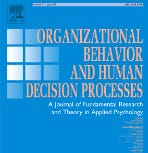New articles in OBHDP (July 10th, 2024)
Secrets at work
https://www.sciencedirect.com/science/article/pii/S074959782400027X
Michael L. Slepian, Eric M. Anicich, Nir Halevy
Although organizational secrecy is central to national security, politics, business, technology, healthcare, and law, its effects are largely unknown. Keeping organizational secrets creates social divides between those who are required to keep the secret and those who are not allowed to know it. In this article, the authors demonstrate that keeping organizational secrets simultaneously evokes feelings of social isolation and status, which have opposing effects on employee well-being. Specifically, organizational secrecy harms well-being through increased work stress, yet enhances well-being through increased meaningfulness of work. In turn, work stress and meaningfulness have opposing effects on overall job satisfaction. These effects emerged across seven studies using varied methodologies. These findings highlight that organizations need to help employees manage the social isolation and stress that can stem from requirements to keep organizational secrets.
Social inferences from choice context: Dominated options can engender distrust
https://www.sciencedirect.com/science/article/pii/S0749597824000293
Jonathan E. Bogard, Joseph S. Reiff, Eugene M. Caruso, Hal E. Hershfield
Imagine you move to a new city and need to purchase new internet services from one of the two major internet service providers in the area. One telecom company offers a standard menu of internet options, and the other company offers a similar set while also including an obviously bad additional option (e.g., one that is more expensive yet has slower speeds). These inferior options are often included as a contrast that is intended to “nudge” people toward the options the company prefers. Rational choice theory suggests that bad options ought to be ignored and you should simply choose among the best available internet plans; in practice, however, offering the poor option may send a meaningful signal about how much you should trust that telecom company. In this article, the authors propose that when a company provides an option that is clearly inferior to alternatives, people tend to distrust the company/person who created that set of choices. This sense of distrust leads people to prefer other providers. The authors provide evidence for these proposals over a series of seven studies using a variety of methodologies. Their findings suggest that organizations should be aware of the detrimental signals they send when trying to nudge or manipulate people by providing inferior options.
P.S. if you can’t access the full-text let us (m-kouchaki@kellogg.northwestern.edu or mikebaer@asu.edu) know and we’d be happy to share a copy.


